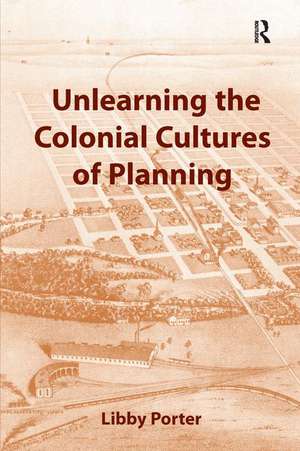Unlearning the Colonial Cultures of Planning
Autor Libby Porteren Limba Engleză Paperback – 9 sep 2016
| Toate formatele și edițiile | Preț | Express |
|---|---|---|
| Paperback (1) | 482.53 lei 6-8 săpt. | |
| Taylor & Francis – 9 sep 2016 | 482.53 lei 6-8 săpt. | |
| Hardback (1) | 1055.51 lei 6-8 săpt. | |
| Taylor & Francis – 28 mar 2010 | 1055.51 lei 6-8 săpt. |
Preț: 482.53 lei
Nou
Puncte Express: 724
Preț estimativ în valută:
92.34€ • 100.27$ • 77.57£
92.34€ • 100.27$ • 77.57£
Carte tipărită la comandă
Livrare economică 22 aprilie-06 mai
Preluare comenzi: 021 569.72.76
Specificații
ISBN-13: 9781138253049
ISBN-10: 1138253049
Pagini: 192
Dimensiuni: 156 x 234 x 10 mm
Greutate: 0.29 kg
Ediția:1
Editura: Taylor & Francis
Colecția Routledge
Locul publicării:Oxford, United Kingdom
ISBN-10: 1138253049
Pagini: 192
Dimensiuni: 156 x 234 x 10 mm
Greutate: 0.29 kg
Ediția:1
Editura: Taylor & Francis
Colecția Routledge
Locul publicării:Oxford, United Kingdom
Cuprins
Contents: Introduction: culture, colonialism and planning; Indigenous people and their challenge to planning; A colonial genealogy of planning; Systematizing space: 'natures', 'cultures' and protected areas; Managing the sacred; Modes of governance: the difference indigeneity makes to progressive planning; Unlearning privilege: towards the decolonization of planning; Bibliography; Index.
Notă biografică
Dr Libby Porter, Lecturer in Spatial Planning, Department of Urban Studies, University of Glasgow, UK
Recenzii
'A path-breaking analysis of planning's complicity in colonialism, and the resulting social injustice for Indigenous peoples. Porter's genealogical analysis does for planning what Latour did for modernity. Her brilliant deconstruction of the colonial cultures of planning opens a space for a more transformative (post) colonial planning.' Leonie Sandercock, University of British Columbia, Canada 'Overall, this book tells many insightful and interesting stories about inappropriate planning practices within indigenous contexts. The book is targeted at academics rather than at practitioners and offers interesting, often provocative, views on matters of ontology and epistemology in the field of protected area and national park planning and management in settler states.' Housing Studies '... a volume that will find a useful role in planning and geography courses addressing indigenous issues and as an informed starting point to any serious study of planning and indigenous issues.' New Zealand Geographer
Descriere
Planning is here shown to be integral to colonial projects, used to appropriate territory for management by the state and then to produce an ordered, coherent system of land regulation and control. This is both a demonstration of how planning was central to the colonial invasion of settler states, and an analysis of how it endures as a colonial practice in complex post-colonial settings.
